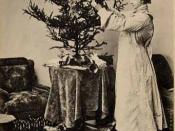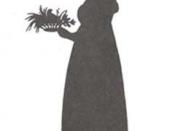A Woman's New Identity
In Henrik Ibsen's drama, A Doll's House, the main characters in the play pretend to be someone who others would like them to be, instead of being their true selves. Nora, throughout the play, is a character who has an impeccable use of role-play. She is Torvald's loving and childish wife, and unknowingly, even to herself, a strong, independent woman. As the play progresses, Nora's persona shifts from that of the everyday playful trophy wife seen by Torvald and friends, to that of a self-empowering, willing woman; an identity in the 1800s that was unheard of.
Nora's first impression to the reader is one of an obedient, crazed, child-like wife. In the first act, Nora seems to solely want money from her husband Torvald. In one of the primary encounters with Torvald after showing him what she just purchased for their children as Christmas gifts, she does not delay in asking for even more money.
Even after asking what she would like for Christmas, money is her answer. It is impressive how Torvald addresses Nora as she was just a little girl, or even a pet, "My little lark mustn't droop her wings like that. What? Is my squirrel in the sulks?" (2). It seems as if he is talking to a small child and he says that as he is giving her money, which makes their interaction seem almost of a relationship between a father and his teenage daughter. This child-like interaction is also consistent throughout the play, only solidifying the fact that Torvald truly treats Nora as if she was his daughter. This makes Nora seem more like a prized possession as opposed to an equal in their marriage, an idea that would have been accepted as a social norm in that time.


